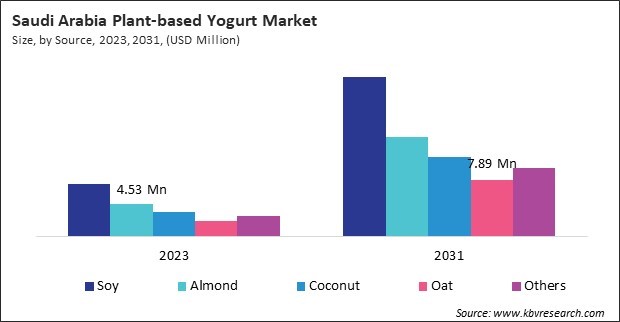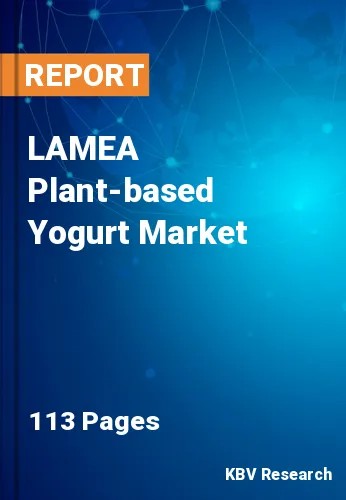The Latin America, Middle East and Africa Plant-based Yogurt Market would witness market growth of 14.8% CAGR during the forecast period (2024-2031).
The Brazil market dominated the LAMEA Plant-based Yogurt Market by Country in 2023, and would continue to be a dominant market till 2031; thereby, achieving a market value of $140.3 million by 2031. The Argentina market is showcasing a CAGR of 15.7% during (2024 - 2031). Additionally, The UAE market would register a CAGR of 13.9% during (2024 - 2031).

Innovations in flavors and product formats have broadened the appeal of this. Brands offer various flavors, from classic vanilla and berry to exotic options like matcha and turmeric, catering to diverse tastes. Advances in production technologies have led to improvements in the texture and creaminess of this yogurt. Innovations such as better thickening agents and fermentation techniques have enhanced the sensory experience, making yogurt more comparable to traditional dairy yogurt.
Support from health organizations and dietary guidelines endorsing plant-based diets has encouraged the adoption of this yogurt. Recommendations promoting plant-based eating patterns contribute to the growing acceptance and consumption of plant-based products. Public health initiatives and campaigns advocating for reduced dairy consumption and increased plant-based eating have positively influenced the adoption of this yogurt. These initiatives help raise awareness and encourage consumers to explore plant-based options.
Expanding the foodservice industry in the UAE reflects growing consumer interest in health and wellness. This trend increases demand for this yogurt, often featured in health-focused restaurants and juice bars. Data from the Dubai Municipality revealed extensive food service establishments in the Dubai Emirate. With 18,667 food establishments, 9,705 are restaurants, 4,310 are coffee shops, 2,809 are cafeterias, 840 are hotels, and 728 are catering services. The growth of Brazil’s food processing industry brings advanced technologies and equipment that enhance the production efficiency of plant-based yogurt, resulting in cost reductions and improved product quality. According to the Brazilian Food Processors Association (ABIA), the country’s food processing sector registered revenues of US$231 billion in 2023, an increase of 7.2% compared to 2022. The result represents 10.8% of the national GDP. The sector comprises over 38,000 companies, most of which are small and medium-sized enterprises. In conclusion, the market's expansion is driven by the rising foodservice sector and the growing food processing industry in the region.
Free Valuable Insights: The Worldwide Plant-based Yogurt Market is Projected to reach USD 7.9 Billion by 2031, at a CAGR of 13.6%
Based on Flavor, the market is segmented into Flavored Yogurt, and Non-Flavored Yogurt. Based on Distribution Channel, the market is segmented into B2C (Hypermarkets & Supermarkets, Specialty Stores, Online, and Others), and B2B. Based on Source, the market is segmented into Soy, Almond, Coconut, Oat, and Others. Based on countries, the market is segmented into Brazil, Argentina, UAE, Saudi Arabia, South Africa, Nigeria, and Rest of LAMEA.
By Flavor
By Distribution Channel
By Source
By Country
Our team of dedicated experts can provide you with attractive expansion opportunities for your business.

